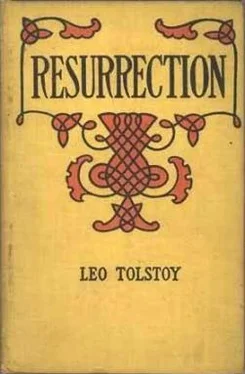Leo Tolstoy - Resurrection
Здесь есть возможность читать онлайн «Leo Tolstoy - Resurrection» весь текст электронной книги совершенно бесплатно (целиком полную версию без сокращений). В некоторых случаях можно слушать аудио, скачать через торрент в формате fb2 и присутствует краткое содержание. Жанр: Русская классическая проза, на английском языке. Описание произведения, (предисловие) а так же отзывы посетителей доступны на портале библиотеки ЛибКат.
- Название:Resurrection
- Автор:
- Жанр:
- Год:неизвестен
- ISBN:нет данных
- Рейтинг книги:4 / 5. Голосов: 1
-
Избранное:Добавить в избранное
- Отзывы:
-
Ваша оценка:
- 80
- 1
- 2
- 3
- 4
- 5
Resurrection: краткое содержание, описание и аннотация
Предлагаем к чтению аннотацию, описание, краткое содержание или предисловие (зависит от того, что написал сам автор книги «Resurrection»). Если вы не нашли необходимую информацию о книге — напишите в комментариях, мы постараемся отыскать её.
Resurrection — читать онлайн бесплатно полную книгу (весь текст) целиком
Ниже представлен текст книги, разбитый по страницам. Система сохранения места последней прочитанной страницы, позволяет с удобством читать онлайн бесплатно книгу «Resurrection», без необходимости каждый раз заново искать на чём Вы остановились. Поставьте закладку, и сможете в любой момент перейти на страницу, на которой закончили чтение.
Интервал:
Закладка:
“At any rate, before I get an answer from Mary Vasilievna (the marechal’s wife), and finish completely with her, I can do nothing,” he said to himself. And the conviction that he might, and was even obliged, to delay his decision, was comforting. “Well, I shall consider all that later on,” he said to himself, as the trap drove silently along the asphalt pavement up to the doors of the Court.
“Now I must fulfil my public duties conscientiously, as I am in the habit of always doing, and as I consider it right to do. Besides, they are often interesting.” And he entered the hall of the Law Courts, past the doorkeeper.
V
The jurymen.
The corridors of the Court were already full of activity. The attendants hurried, out of breath, dragging their feet along the ground without lifting them, backwards and forwards, with all sorts of messages and papers. Ushers, advocates, and law officers passed hither and thither. Plaintiffs, and those of the accused who were not guarded, wandered sadly along the walls or sat waiting.
“Where is the Law Court?” Nekhludoff asked of an attendant.
“Which? There is the Civil Court and the Criminal Court.”
“I am on the jury.”
“The Criminal Court you should have said. Here to the right, then to the left—the second door.”
Nekhludoff followed the direction.
Meanwhile some of the Criminal Court jurymen who were late had hurriedly passed into a separate room. At the door mentioned two men stood waiting.
One, a tall, fat merchant, a kind-hearted fellow, had evidently partaken of some refreshments and a glass of something, and was in most pleasant spirits. The other was a shopman of Jewish extraction. They were talking about the price of wool when Nekhludoff came up and asked them if this was the jurymen’s room.
“Yes, my dear sir, this is it. One of us? On the jury, are you?” asked the merchant, with a merry wink.
“Ah, well, we shall have a go at the work together,” he continued, after Nekhludoff had answered in the affirmative. “My name is Baklasheff, merchant of the Second Guild,” he said, putting out his broad, soft, flexible hand.
“With whom have I the honour?”
Nekhludoff gave his name and passed into the jurymen’s room.
Inside the room were about ten persons of all sorts. They had come but a short while ago, and some were sitting, others walking up and down, looking at each other, and making each other’s acquaintance. There was a retired colonel in uniform; some were in frock coats, others in morning coats, and only one wore a peasant’s dress.
Their faces all had a certain look of satisfaction at the prospect of fulfilling a public duty, although many of them had had to leave their businesses, and most were complaining of it.
The jurymen talked among themselves about the weather, the early spring, and the business before them, some having been introduced, others just guessing who was who. Those who were not acquainted with Nekhludoff made haste to get introduced, evidently looking upon this as an honour, and he taking it as his due, as he always did when among strangers. Had he been asked why he considered himself above the majority of people, he could not have given an answer; the life he had been living of late was not particularly meritorious. The fact of his speaking English, French, and German with a good accent, and of his wearing the best linen, clothes, ties, and studs, bought from the most expensive dealers in these goods, he quite knew would not serve as a reason for claiming superiority. At the same time he did claim superiority, and accepted the respect paid him as his due, and was hurt if he did not get it. In the jurymen’s room his feelings were hurt by disrespectful treatment. Among the jury there happened to be a man whom he knew, a former teacher of his sister’s children, Peter Gerasimovitch. Nekhludoff never knew his surname, and even bragged a bit about this. This man was now a master at a public school. Nekhludoff could not stand his familiarity, his self-satisfied laughter, his vulgarity, in short.
“Ah ha! You’re also trapped.” These were the words, accompanied with boisterous laughter, with which Peter Gerasimovitch greeted Nekhludoff. “Have you not managed to get out of it?”
“I never meant to get out of it,” replied Nekhludoff, gloomily, and in a tone of severity.
“Well, I call this being public spirited. But just wait until you get hungry or sleepy; you’ll sing to another tune then.”
“This son of a priest will be saying ‘thou’ [2] in Russian, as in many other languages, “thou” is used generally among people very familiar with each other, or by superiors to inferiors
to me next,” thought Nekhludoff, and walked away, with such a look of sadness on his face, as might have been natural if he had just heard of the death of all his relations. He came up to a group that had formed itself round a clean-shaven, tall, dignified man, who was recounting something with great animation. This man was talking about the trial going on in the Civil Court as of a case well known to himself, mentioning the judges and a celebrated advocate by name. He was saying that it seemed wonderful how the celebrated advocate had managed to give such a clever turn to the affair that an old lady, though she had the right on her side, would have to pay a large sum to her opponent. “The advocate is a genius,” he said.
The listeners heard it all with respectful attention, and several of them tried to put in a word, but the man interrupted them, as if he alone knew all about it.
Though Nekhludoff had arrived late, he had to wait a long time. One of the members of the Court had not yet come, and everybody was kept waiting.
VI
The judges.
The president, who had to take the chair, had arrived early. The president was a tall, stout man, with long grey whiskers. Though married, he led a very loose life, and his wife did the same, so they did not stand in each other’s way. This morning he had received a note from a Swiss girl, who had formerly been a governess in his house, and who was now on her way from South Russia to St. Petersburg. She wrote that she would wait for him between five and six p.m. in the Hotel Italia. This made him wish to begin and get through the sitting as soon as possible, so as to have time to call before six p.m. on the little red-haired Clara Vasilievna, with whom he had begun a romance in the country last summer. He went into a private room, latched the door, took a pair of dumb-bells out of a cupboard, moved his arms 20 times upwards, downwards, forwards, and sideways, then holding the dumb-bells above his head, lightly bent his knees three times.
“Nothing keeps one going like a cold bath and exercise,” he said, feeling the biceps of his right arm with his left hand, on the third finger of which he wore a gold ring. He had still to do the moulinee movement (for he always went through those two exercises before a long sitting), when there was a pull at the door. The president quickly put away the dumb-bells and opened the door, saying, “I beg your pardon.”
One of the members, a high-shouldered, discontented-looking man, with gold spectacles, came into the room. “Matthew Nikitich has again not come,” he said, in a dissatisfied tone.
“Not yet?” said the president, putting on his uniform. “He is always late.”
“It is extraordinary. He ought to be ashamed of himself,” said the member, angrily, and taking out a cigarette.
This member, a very precise man, had had an unpleasant encounter with his wife in the morning, because she had spent her allowance before the end of the month, and had asked him to give her some money in advance, but he would not give way to her, and they had a quarrel. The wife told him that if he were going to behave so, he need not expect any dinner; there would be no dinner for him at home. At this point he left, fearing that she might carry out her threat, for anything might be expected from her. “This comes of living a good, moral life,” he thought, looking at the beaming, healthy, cheerful, and kindly president, who, with elbows far apart, was smoothing his thick grey whiskers with his fine white hands over the embroidered collar of his uniform. “He is always contented and merry while I am suffering.”
Читать дальшеИнтервал:
Закладка:
Похожие книги на «Resurrection»
Представляем Вашему вниманию похожие книги на «Resurrection» списком для выбора. Мы отобрали схожую по названию и смыслу литературу в надежде предоставить читателям больше вариантов отыскать новые, интересные, ещё непрочитанные произведения.
Обсуждение, отзывы о книге «Resurrection» и просто собственные мнения читателей. Оставьте ваши комментарии, напишите, что Вы думаете о произведении, его смысле или главных героях. Укажите что конкретно понравилось, а что нет, и почему Вы так считаете.












